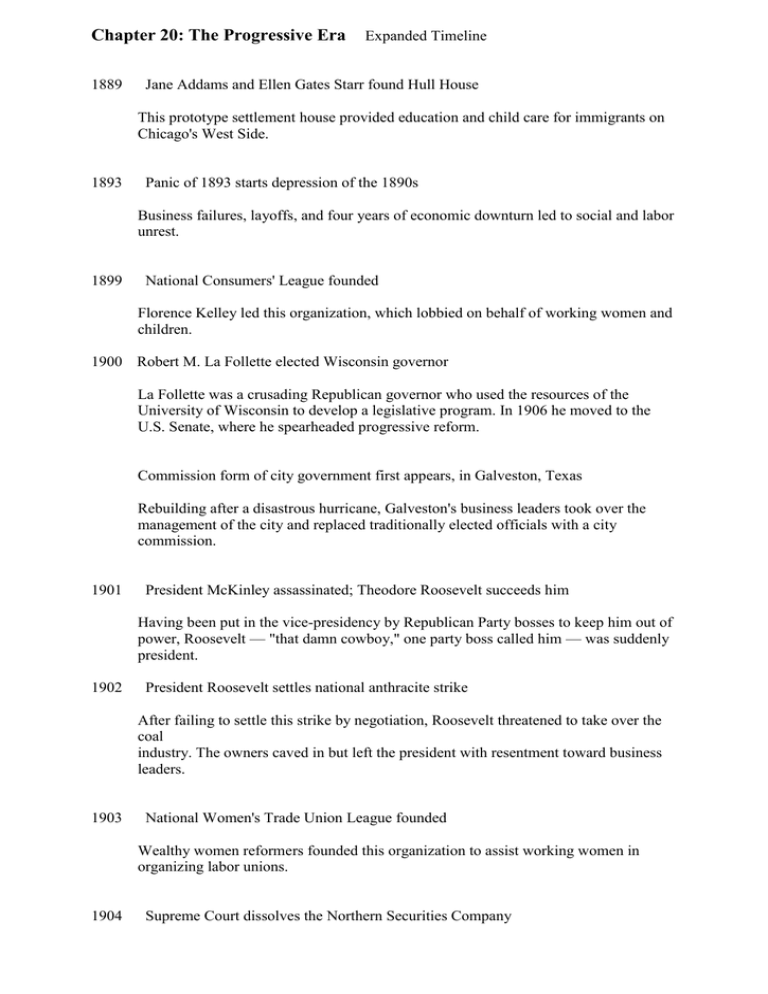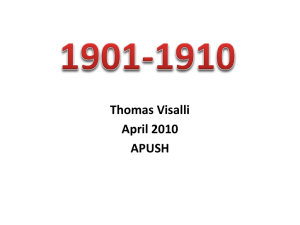Chapter 20 The Progressive Era
advertisement

Chapter 20: The Progressive Era 1889 Expanded Timeline Jane Addams and Ellen Gates Starr found Hull House This prototype settlement house provided education and child care for immigrants on Chicago's West Side. 1893 Panic of 1893 starts depression of the 1890s Business failures, layoffs, and four years of economic downturn led to social and labor unrest. 1899 National Consumers' League founded Florence Kelley led this organization, which lobbied on behalf of working women and children. 1900 Robert M. La Follette elected Wisconsin governor La Follette was a crusading Republican governor who used the resources of the University of Wisconsin to develop a legislative program. In 1906 he moved to the U.S. Senate, where he spearheaded progressive reform. Commission form of city government first appears, in Galveston, Texas Rebuilding after a disastrous hurricane, Galveston's business leaders took over the management of the city and replaced traditionally elected officials with a city commission. 1901 President McKinley assassinated; Theodore Roosevelt succeeds him Having been put in the vice-presidency by Republican Party bosses to keep him out of power, Roosevelt — "that damn cowboy," one party boss called him — was suddenly president. 1902 President Roosevelt settles national anthracite strike After failing to settle this strike by negotiation, Roosevelt threatened to take over the coal industry. The owners caved in but left the president with resentment toward business leaders. 1903 National Women's Trade Union League founded Wealthy women reformers founded this organization to assist working women in organizing labor unions. 1904 Supreme Court dissolves the Northern Securities Company This landmark case against a railroad trust reflected the beginning of a change in attitude on the part of the Supreme Court. 1905 Lochner v. New York overturns law restricting length of the workday The U.S. Supreme Court overturned a law limiting the number of hours a day employees could be required to work, saying that both parties to a contract were free to accept or reject the conditions enumerated therein. 1906 Upton Sinclair's The Jungle This muckraking novel about the stockyards and the meatpacking industry in Chicago provided the impetus for the federal government's adoption of food and drug regulations. Hepburn Railway Act This legislation empowered the Interstate Commerce Commission (ICC) to regulate railroad rates and examine company financial records. AFL adopts "Bill of Grievances" When Congress rejected this request for support against court injunctions aimed at unions, the American Federation of Labor (AFL) decided to become more active in electoral politics. 1908 Muller v. Oregon upholds regulation of working hours for women The Supreme Court upheld the right of states to pass protective legislation for women workers, in this case, limiting the workday to ten hours. Federal Council of Churches founded Protestant churches subscribing to the Social Gospel movement organized this federation to coordinate their urban-reform activities. William Howard Taft elected president Theodore Roosevelt's hand-picked successor took office and immediately began to disappoint his sponsor. 1909 NAACP formed White progressives and socialists joined with black activists to form an organization concerned with racial uplift and equality for African Americans. Herbert Croly's Promise of American Life This work combined the federalism of Alexander Hamilton with the republicanism of Thomas Jefferson in calling for a new statist policy of social, economic, and political reform. 1910 Roosevelt announces the New Nationalism Based partially on Croly's ideas, Roosevelt's new program called for massive federal intervention in corporate economic affairs and an enhanced social-welfare program. Woman suffrage movement revives; suffrage victory in Washington State The emergence of modern feminism contributed to this revival. The suffragists adopted new tactics in pursuing the ballot. 1911 Standard Oil decision restores "rule of reason" The Supreme Court ordered the dissolution of the oil trust, basing its decision on the "rule of reason"; that is, the court had the right to decide for itself what actions constituted an illegal restraint of trade. Triangle Shirtwaist fire This tragic event in New York City, which caused the deaths of 146 workers, stirred the political community in New York State to pass the most comprehensive laws to date requiring safer workplaces. 1912 Progressive Party formed When the Republicans rejected Roosevelt as presidential nominee in 1912, he led progressives out of the convention and organized the Progressive ("Bull Moose") Party. Woodrow Wilson elected president The split in Republican ranks enabled the Democrat Wilson to become president with only 42 percent of the popular vote. 1913 Federal Reserve Act The establishment of the Federal Reserve Board to control financial reserves helped strengthen and stabilize the nation's banking industry. Underwood Tariff Act Enacted in 1913, this act lowered tariff rates, particularly in trust-dominated industries, to an average rate of 25 percent. Consumer prices on imported goods were therefore reduced. 1914 Clayton Antitrust Act This act became effective with the establishment of the Federal Trade Commission, which had the power to investigate unfair trade practices and issue rulings restraining improper activity.



